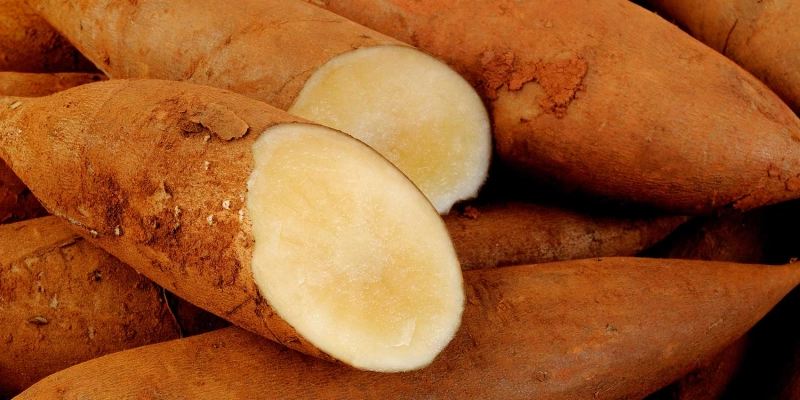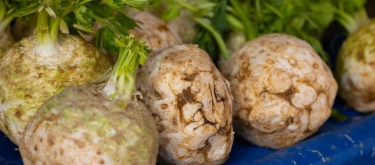Yacón: Taste Profile, Aroma, Benefits and Health Risks
Yacón (Smallanthus sonchifolius) is a crisp, sweet-tasting tuber native to the Andes of South America. Known as the “Peruvian ground apple,” yacón has long been valued for its refreshing flavor and its potential health benefits. With its increasing popularity as a natural sweetener and prebiotic food, yacón is now cultivated worldwide and used in both traditional and modern dishes.
Yacón is generally well-tolerated and is suitable for most diets, including vegan and vegetarian. It is naturally gluten-free and low in calories. Individuals with allergies to other root vegetables should exercise caution when trying yacón for the first time. Excessive consumption may cause mild digestive discomfort due to its high content of prebiotic fibers.
What does Yacón taste like?

Complete Sensory Description
Yacón has a refreshingly sweet, juicy flavor reminiscent of a cross between apple, watermelon, and pear, with a subtle earthy undertone.
The first impression is a light, crisp sweetness, highlighted by notes of honey and fresh melon. The texture is exceptionally crunchy and watery, similar to jicama or a very juicy Asian pear. As you chew, the sweetness becomes more pronounced, balanced by a faint earthiness and a mild, herbal finish. The aftertaste is clean and mildly floral, leaving the palate feeling refreshed. Yacón’s translucent flesh and golden skin further enhance its bright, appealing sensory profile.
In-depth Flavor Analysis
Yacón’s sweetness is primarily due to its high content of fructooligosaccharides (FOS), a type of prebiotic fiber that tastes sweet but is not fully digested by the human body. This gives yacón a low glycemic index and makes it safe for most people with diabetes. The tuber contains simple sugars, organic acids, and aromatic compounds that contribute to its complex, honeyed flavor and crisp, watery texture. Subtle earthy notes come from terpenes and polyphenols present in the root, especially in freshly harvested yacón.
Culinary Uses and Forms of Consumption
Fresh yacón:
Yacón is most often eaten raw, sliced into salads or served as a snack. Its crisp, juicy flesh is enjoyed on its own or with a squeeze of citrus for added brightness. In South America, it is sometimes peeled and eaten like an apple, or paired with lime and chili powder for a refreshing street food treat.
Best pairings: Yacón combines well with tropical fruits, citrus, mild cheeses, and leafy greens.
Cooked yacón:
While less common, yacón can be lightly sautéed, roasted, or added to stir-fries, where it retains some crunch and takes on subtle caramel notes. When cooked, it may be used in vegetable medleys, baked dishes, or as an addition to stews. In some regions, it is boiled or steamed and served as a side dish.
Yacón’s natural sweetness allows it to be incorporated into jams, preserves, or even baked goods.
Processed yacón (syrup, chips, powder):
Yacón is increasingly processed into syrup, powder, and dried chips. Yacón syrup is used as a natural, low-calorie sweetener in drinks, yogurt, and desserts. Dried yacón chips are eaten as a crunchy snack, while powdered yacón can be added to smoothies or health bars for added fiber and a gentle, fruity sweetness.
Not recommended:
Yacón does not pair well with strong, bitter, or heavily spiced dishes, as its delicate flavor may be overpowered. Extended cooking or high heat can break down its crisp texture and reduce sweetness.
Selection, Preparation, and Storage
Selection:
Choose yacón tubers that are firm, heavy for their size, and free from soft spots, mold, or excessive wrinkling.
Preparation:
Rinse well and peel before eating or cooking, as the skin can be tough. Slice or dice for salads, or grate for use in slaws. To prevent browning, toss cut pieces with lemon or lime juice.
Storage:
Store whole, unpeeled yacón in a cool, dry place for up to two weeks. Once peeled or cut, refrigerate in an airtight container and consume within a few days. Yacón syrup and dried products should be kept tightly sealed in a cool, dark place.

Nutritional Insights
Yacón is low in calories and contains a high amount of dietary fiber, primarily in the form of fructooligosaccharides (FOS), which act as prebiotics and support digestive health. It also provides potassium, antioxidants, and small amounts of vitamin C.
Potential benefits:
-
Supports gut health by nourishing beneficial gut bacteria
-
May help regulate blood sugar due to its low glycemic index
-
Contributes to hydration and satiety because of its high water content
-
Suitable for weight management and diabetes-friendly diets
Historical and Cultural Significance
Yacón has been cultivated in the Andean region for over a thousand years, valued by indigenous peoples such as the Inca and the Quechua for its refreshing taste and medicinal uses. Traditionally eaten fresh or used to sweeten drinks and desserts, yacón played a role in local diets as a source of hydration and energy during long journeys. In recent decades, yacón has gained recognition outside South America, especially in Japan and Australia, where it is prized for its health-promoting properties and is used in both traditional and modern cuisine. The root remains an important symbol of Andean agricultural heritage and cultural identity.
Interesting and Curious Facts
Yacón has been cultivated in the Andes for over a thousand years, prized by indigenous peoples for its refreshing taste and medicinal uses. The name “yacón” comes from the Quechua word for “watery root.” In Japan and Australia, yacón is now a popular crop for both its taste and health benefits.
Harm and Dietary Considerations
Yacón is considered safe for most people, but excessive consumption may cause mild gas or bloating due to its high prebiotic content. Rare allergic reactions may occur in those sensitive to root vegetables. Generally safe for pregnant and breastfeeding women in normal food amounts.
Religious Dietary Considerations
Yacón is plant-based, suitable for vegetarian, vegan, Halal, Kosher, Hindu, and Buddhist diets.
Final Thoughts & Sensory Journey
Yacón brings a refreshing, crisp sweetness to the table, reminiscent of apple and melon, with a clean finish that delights and hydrates. Its unique combination of taste, texture, and health benefits make it a versatile addition to both traditional and modern cuisine.
Resources
-
Davidson, A. (2014). The Oxford Companion to Food. Oxford University Press. ISBN 978-0199677337
-
Genta, S. et al. (2009). “Yacón syrup: beneficial effects on obesity and insulin resistance in humans.” Clinical Nutrition.
-
McGee, H. (2004). On Food and Cooking: The Science and Lore of the Kitchen. Scribner. ISBN 978-0684800011
-
Journal of Food Science, 2012, “Nutritional Properties and Prebiotic Effects of Yacón”








